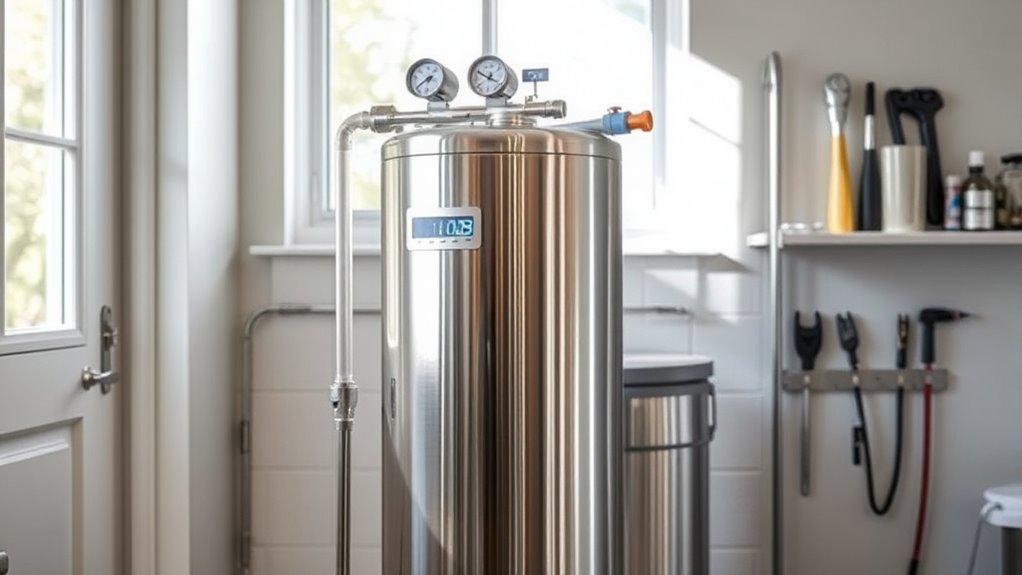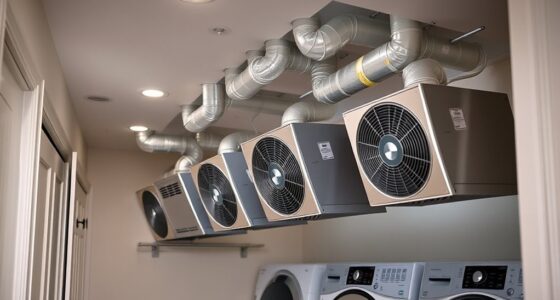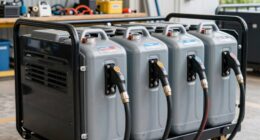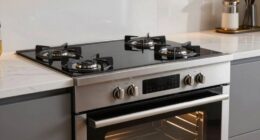If you’re looking for the best iron filtration systems for well water, I recommend considering models like the iSpring WCFM500K and the 3-stage Whole House System, which effectively remove iron, manganese, sulfur, and other contaminants while maintaining essential minerals. These systems support large flow rates and require minimal maintenance. Proper installation and selecting the right system for your water levels are key. Keep going to discover more options tailored to your needs.
Key Takeaways
- Look for multi-stage systems capable of removing high iron levels (up to 12 ppm) and other contaminants for comprehensive water purification.
- Choose systems with long-lasting filters and high capacity (up to 1 million gallons) to reduce maintenance and ensure continuous safe drinking water.
- Prioritize options with features like air injection or UV disinfection for effective iron removal and microbial safety.
- Ensure compatibility with well water conditions, including manganese and hydrogen sulfide removal, for optimal water quality.
- Consider ease of installation, maintenance, and durable construction to ensure reliable, safe, and clean water over the system’s lifespan.
iSpring WCFM500K Whole House Water Filtration System
If you’re looking for a reliable solution to remove high levels of iron and other contaminants from well water, the iSpring WCFM500K Whole House Water Filtration System is an excellent choice. It effectively reduces iron (up to 12 ppm), manganese, hydrogen sulfide (up to 20 ppm), solids, and turbidity through 3-micron sediment filtration. Designed for well water, it delivers clean, safe water from every faucet. The system boasts a lifespan of up to 10 years with automatic media regeneration, eliminating the need for frequent filter changes. Its user-friendly LED control panel allows easy setup, and it operates chemically free using air, ensuring safe, mineral-retaining filtration.
Best For: homeowners with well water seeking an effective, chemical-free system to remove iron, manganese, hydrogen sulfide, and turbidity while retaining essential minerals.
Pros:
- Effectively reduces iron, manganese, hydrogen sulfide, solids, and turbidity with 3-micron sediment filtration
- Long-lasting up to 10 years with automatic media regeneration, reducing maintenance needs
- Uses air for regeneration, avoiding chemicals and ensuring environmentally friendly filtration
Cons:
- Does not lower TDS levels; minerals are retained in water
- May require pairing with an additional RO system for comprehensive TDS reduction
- Initial setup and configuration may require some technical familiarity
iSpring Iron Hydrogen Sulfide & Manganese Whole House Water Filter System
Looking for a reliable solution to remove iron, hydrogen sulfide, and manganese from your well water? The iSpring Iron Hydrogen Sulfide & Manganese Whole House Water Filter System offers advanced three-stage filtration to tackle these contaminants effectively. It uses a sediment filter to trap particles, a compound filter targeting heavy metals and chemicals, and an iron filter to reduce iron and manganese levels. Designed for a household of four, it delivers up to 15 GPM with minimal pressure loss and lasts up to a year before filter replacement. Easy to install and maintain, it guarantees your water is cleaner, safer, and better tasting.
Best For: households seeking an effective, maintenance-friendly system to remove iron, hydrogen sulfide, and manganese from well water without removing essential minerals.
Pros:
- Three-stage filtration effectively reduces sediments, heavy metals, iron, manganese, chlorine, and hydrogen sulfide
- Designed for easy DIY installation with clear instructions and compatible fittings
- Long-lasting filters with up to one year of service before replacement
Cons:
- May require additional TDS reduction solutions if mineral content is a concern
- Filter replacement frequency depends on water quality and usage, possibly increasing costs in high-contaminant areas
- Larger system size may require sufficient space for installation
Whole House Water Filter System, 2-Stage Home Filtration
A whole house water filter system with 2-stage home filtration is an excellent choice for households with multiple bathrooms seeking thorough water treatment. It treats up to 1 million gallons, removing sediment, chlorine, VOCs, heavy metals, and other contaminants. The system features a washable sediment filter and GAC-KDF media, which improve taste and safety. With large inlet/outlet ports, it maintains strong water pressure throughout your home. Easy to install and maintain, it includes a reusable pre-filter to reduce costs. While some experience minor flow reductions, this system offers a cost-effective, reliable solution for ensuring clean, safe water for your entire household.
Best For: households with 4–6 bathrooms seeking comprehensive, whole-house water filtration to remove sediment, chemicals, heavy metals, and contaminants for improved water quality throughout the home.
Pros:
- Effective 2-stage filtration system treating up to 1 million gallons, suitable for large households
- Easy to install and maintain with reusable pre-filter, reducing ongoing costs
- Maintains high flow rate with large 1-inch inlet/outlet ports for strong water pressure
Cons:
- Some users report flow reduction from about 17 GPM to approximately 11 GPM after installation
- Occasional issues with pressure drops, backflow, or blue staining in laundry if not properly installed or water tested
- Mixed customer experiences with product quality, customer service, and warranty support
3-Stage Whole House Water Filter System with Sediment Pre-Filter
The Stage Whole House Water Filter System with Sediment Pre-Filter stands out as an excellent choice for homeowners seeking all-encompassing protection against sediment, chlorine, and chemical contaminants. It features a three-stage process: a Pleated Sediment Pre-Filter captures large particles like dirt and rust; a Copper-Zinc filter reduces chlorine, heavy metals, and inhibits microorganisms; and a Coconut Activated Carbon filter absorbs chemicals, VOCs, pesticides, and odors. With a capacity of 600,000 gallons, it provides long-term, reliable filtration for homes with 1-3 bathrooms. This system improves water taste, protects appliances, and guarantees safe, clean water for drinking, bathing, and cooking.
Best For: homeowners seeking comprehensive, long-lasting protection against sediment, chlorine, and chemical contaminants for their entire household water supply.
Pros:
- Provides whole-house filtration with a capacity of 600,000 gallons, ensuring over 10 years of use for typical households.
- Effectively reduces chlorine, heavy metals, VOCs, pesticides, and sediment, improving water taste and safety.
- Easy to install with high-flow ports and includes all necessary components, plus long-term maintenance options.
Cons:
- Some plastic components may crack or degrade if incompatible plumbing materials like plumbers putty are used.
- TDS levels may remain unchanged, raising questions about the removal of certain dissolved contaminants.
- Proper installation and maintenance are critical; incorrect flow direction or clogging can reduce performance.
iSpring Whole House Water Filter System
If you need a reliable whole-house filtration system that tackles iron, manganese, sediment, and industrial contaminants, the iSpring WGB32BM stands out as a top choice. It features a three-stage process: a polypropylene sediment filter down to 5 microns, a coconut shell carbon block filter, and a specialized iron filter (FM25B) that removes up to 3 ppm of iron and 1 ppm of manganese. Supporting flow rates of 15 GPM and capable of filtering 100,000 gallons, it’s ideal for a family of four. Easy to install DIY, it maintains water clarity, taste, and appliance longevity without reducing TDS, making it a versatile, high-performance solution for well water.
Best For: households seeking comprehensive whole-house water filtration that effectively removes iron, manganese, sediment, and industrial contaminants, especially in well water or areas with sulfur odors.
Pros:
- Three-stage filtration ensures thorough removal of sediment, chlorine, iron, and manganese.
- Supports high flow rates of 15 GPM and filters up to 100,000 gallons, ideal for families.
- Easy DIY installation with detailed manuals and YouTube tutorials, plus reliable customer support.
Cons:
- Registration for the lifetime technical support can be challenging.
- The specialized iron filter media (FM25B) may require replacement every few years depending on water quality.
- Outdoor installation or high-temperature environments may need additional protective housing.
Durawater Air Injection Iron Filter
Looking for an effective iron filtration system that’s easy to install on your own? The Durawater Air Injection Iron Filter, Black Series, might be just what you need. Its Black Series HD digital air injection system creates air pockets that promote super oxidation, boosting filtration efficiency. It handles iron levels up to 12 ppm, manganese up to 2 ppm, and sulfur (H₂S) up to 10 ppm. Designed for both residential and commercial use, it’s simple to install with the included instructions and basic plumbing skills. This filter effectively removes iron, manganese, and sulfur, ensuring your water is clean, safe, and great-tasting.
Best For: homeowners and small businesses seeking an easy-to-install, effective solution for removing iron, manganese, and sulfur from their water supply.
Pros:
- Easy DIY installation with comprehensive instructions and basic plumbing skills required
- Effective removal of iron (up to 12 ppm), manganese (up to 2 ppm), and sulfur (up to 10 ppm)
- Air injection system enhances filtration efficiency through super oxidation
Cons:
- May require periodic maintenance to regenerate or replace filters
- Limited to water treatment for specific contaminant levels; not suitable for extremely high concentrations
- Installation and operation may be less effective in very hard or highly mineralized water conditions
iSpring WCFM500K Whole House Water Filtration System
For homeowners dealing with iron, manganese, or hydrogen sulfide in well water, the iSpring WCFM500K Whole House Water Filtration System stands out as an effective solution. It reduces iron (up to 12 ppm), manganese, and hydrogen sulfide (up to 20 ppm), along with solids and turbidity, through 3-micron sediment filtration. Designed for well water, it ensures clean, safe water from every faucet. The system lasts up to 10 years with automatic media regeneration, which uses air instead of chemicals, making it eco-friendly. With a user-friendly LED control panel and minimal maintenance, this system provides reliable, high-quality water without reducing beneficial minerals or requiring frequent filter changes.
Best For: homeowners with well water experiencing issues with iron, manganese, or hydrogen sulfide seeking a chemical-free, maintenance-friendly filtration system.
Pros:
- Effectively reduces iron, manganese, hydrogen sulfide, solids, and turbidity through sediment filtration
- Lasts up to 10 years with automatic media regeneration, eliminating frequent filter replacements
- Uses air for regeneration, avoiding chemicals and making it an eco-friendly solution
Cons:
- Does not reduce Total Dissolved Solids (TDS) or minerals, so additional filtration may be needed for complete purification
- Requires initial setup of auto-flush intervals via the LED control panel, which may be complex for some users
- Not specifically designed for city water or other sources; optimized primarily for well water conditions
Waterdrop Whole House Water Filter System with 5-Stage Filtration
The Waterdrop Whole House Water Filter System with 5-Stage Filtration stands out for households seeking thorough, reliable removal of iron, manganese, and chlorine. Its multi-stage process combines iron and manganese reducers with GAC filters made from natural coconut shells, effectively reducing up to 99.3% of iron, 96.8% of manganese, and 95.63% of chlorine. With a lifespan of about six months per filter, it offers cost savings and consistent performance. Built to withstand high water pressure, it’s easy to install and maintain, making it a durable solution that protects your pipes and appliances while delivering clean, great-tasting water throughout your home.
Best For: households seeking comprehensive, reliable filtration to effectively remove iron, manganese, and chlorine while protecting their plumbing and appliances.
Pros:
- 5-stage filtration with high removal efficiency for iron, manganese, and chlorine
- Long-lasting filters with approximately six months lifespan, reducing replacement costs
- Durable construction tested over 100,000 water hammer and pressure cycles, suitable for high-pressure conditions
Cons:
- Installation requires proper use of Teflon tape to prevent pipe damage
- Replacement filters need to be purchased regularly, approximately every six months
- DIY installation may be challenging for those unfamiliar with plumbing or water systems
Fleck 5600 SXT Air Injection Iron and Manganese Filter
If you need an effective solution for removing iron, manganese, and sulfur from well water, the Fleck 5600 SXT Air Injection Iron and Manganese Filter is an excellent choice. This system features a durable black series design and a 1.5-cubic-foot capacity, making it highly efficient. Its digital air injection system creates air pockets to super oxidize contaminants, enhancing filtration. It can remove iron up to 12 ppm, sulfur up to 10 ppm, and manganese up to 2 ppm. Plus, it’s easy to install with basic plumbing skills, and the detailed instructions make setup straightforward, ensuring you get clean, safe water with minimal hassle.
Best For: homeowners seeking an effective, easy-to-install solution for removing iron, manganese, and sulfur from well water to ensure safe, clean water.
Pros:
- Highly effective at removing iron (up to 12 ppm), manganese (up to 2 ppm), and sulfur (up to 10 ppm).
- Durable black series construction with a 1.5 cu ft capacity for increased filtration efficiency.
- Easy to install independently with provided instructions and basic plumbing skills.
Cons:
- Installation may require some basic plumbing knowledge; not fully plug-and-play for complete beginners.
- May require regular maintenance and salt refilling depending on water usage.
- Larger system size might not be suitable for very tight spaces or small setups.
Ultraviolet Water System (4C101)
The Ultraviolet Water System (4C101) stands out as an excellent choice for those seeking a chemical-free, whole-house water treatment solution that delivers reliable microbial disinfection. It features a durable stainless steel chamber with a 10 GPM flow rate, making it suitable for most households. The system uses UV light to effectively eliminate bacteria and viruses without adding chemicals or byproducts, preserving water’s taste and pH. With a long-lasting lamp rated for 10,000 hours and a user-friendly LED controller, it offers low maintenance and dependable performance. While it comes at a higher price, its durability and chemical-free operation make it a smart investment for safe, clean water.
Best For: households seeking a reliable, chemical-free whole-house water treatment system with durable components and easy maintenance.
Pros:
- Long-lasting UV lamp rated for 10,000 hours ensures minimal replacement frequency
- Stainless steel chamber provides durability and corrosion resistance
- Chemical-free disinfection preserves water taste, odor, and pH levels
Cons:
- Higher price point compared to similar systems available on Amazon
- Quartz sleeve breakage can occur during maintenance, requiring careful handling
- Replacement parts such as bulbs and sleeves may have longer lead times, necessitating planning and extra supplies
Waterdrop Spin Down Sediment Filter for Whole House Water Systems
For homeowners seeking a reliable way to protect their entire plumbing system from sediment and debris, the Waterdrop Spin Down Sediment Filter stands out. It’s designed to trap dirt, rust, sand, and small objects from well or municipal water supplies, reducing strain on downstream filters and appliances. Made with durable materials like a heavy-duty plastic shell and cast brass housing, it withstands high pressure and impacts. The transparent canister allows easy monitoring, while the backwash feature simplifies maintenance. Installation is straightforward, and the system’s versatility fits various plumbing setups. Overall, it’s a cost-effective, long-lasting solution to improve water quality throughout your home.
Best For: homeowners looking for an easy-to-maintain, durable sediment filtration system to protect their entire plumbing network from dirt, rust, and debris.
Pros:
- Made with heavy-duty plastic and cast brass for durability and high-pressure resistance
- Transparent canister allows easy inspection and monitoring of trapped debris
- Backwash feature simplifies maintenance and extends filter lifespan
Cons:
- Exposure to sunlight can promote algae growth if not properly covered
- Some users experience minor leaks at connections if not installed correctly
- Finer filters (40-50 microns) may reduce water flow and require careful sizing
HQUA WF3-01 3-Stage Whole House Water Filtration System
When searching for a reliable whole house filtration system that handles heavy metals and improves water quality, the HQUA WF3-01 stands out with its three-stage design and high flow rate. It effectively reduces lead, mercury, copper, chloramine, sediment, VOCs, and chlorine, resulting in clean, odor-free, great-tasting water. Its durable brass fittings, heavy-duty housings, and 15 GPM capacity ensure consistent performance and durability. Monitoring is straightforward with pressure gauges and 180-day timers for cartridge replacement. Installation is easy, and customer support is responsive. Overall, it’s a robust, efficient choice for those wanting comprehensive filtration and reliable, high-quality water.
Best For: households seeking a high-capacity, comprehensive whole house water filtration system to effectively remove heavy metals, chemicals, and sediment for improved water quality and taste.
Pros:
- Effectively reduces heavy metals, chloramine, sediment, VOCs, and chlorine, ensuring safe and great-tasting water
- Durable construction with brass fittings and heavy-duty housings for long-term reliability
- High flow rate of up to 15 GPM supports large household needs without pressure drops
Cons:
- Initial setup may cause leaks if secondary O rings are missing or improperly installed
- Instructions could be clearer regarding assembly and maintenance procedures
- Some users may find the system’s size and weight require sturdy mounting and additional support
SimPure Whole House Water Filter Housing (DB20P)
If you’re looking for a durable, reliable whole-house filtration solution that fits standard 4.5″ x 20″ cartridges, the SimPure DB20P Housing stands out. Made of reinforced polypropylene, it’s NSF tested, highly durable, and resistant to chemicals. Its upgraded design includes raised threaded holes to prevent leaks, dual O-rings for a secure seal, and brass inlet/outlet ports with 1 NPT threads for better sealing. Easy to install with included tools, it handles high temperatures up to 248°F. Customers praise its heavy-duty build, efficient sediment removal, and straightforward setup. Proper tightening and sealant application are key to avoiding leaks, making it a solid choice for well water filtration.
Best For: homeowners seeking a durable, easy-to-install whole-house water filtration system compatible with standard 4.5″ x 20″ cartridges.
Pros:
- Heavy-duty reinforced polypropylene construction for long-lasting durability and chemical resistance
- Upgraded design features like raised threaded holes and dual O-rings for secure, leak-proof sealing
- Easy installation with included tools and compatibility with various filter brands
Cons:
- Large size requires ample space and may be challenging to install in tight areas
- Pressure relief valve can leak if not properly maintained or tightened
- Proper sealing on threaded connections requires careful use of Teflon tape and silicone grease
Whole House Water Filter System with Iron & Manganese Removal
A whole house water filter system with iron and manganese removal stands out as an ideal choice for homeowners seeking extensive protection against common well water contaminants. It provides 3-stage filtration that guarantees every faucet delivers crystal-clear, safe water. Designed to target iron, manganese, lead, and arsenic, it prevents stains, odors, and improves taste. Built with durable stainless steel components, pressure gauges, and easy-access features, it simplifies maintenance. Supporting flow rates of 0.25 gallons per second, it’s perfect for homes with water softeners, ideally installed before the softener to prevent buildup. Regular filter replacements keep the system working efficiently, safeguarding your plumbing and health.
Best For: homeowners with well water or those seeking comprehensive filtration to remove iron, manganese, lead, and arsenic, ensuring clean and safe water throughout their home.
Pros:
- Provides whole house filtration with 3-stage process for comprehensive water quality improvement
- Durable stainless steel construction with easy-access features for simple maintenance
- Supports high flow rate of 0.25 gallons per second, suitable for most household needs
Cons:
- Does not reduce total dissolved solids (TDS), so additional filtration may be necessary for mineral removal
- Recommended filter replacement every 6-12 months, which can incur ongoing maintenance costs
- Installation is ideally before water softeners, requiring proper plumbing setup
Factors to Consider When Choosing Iron Filtration Systems for Well Water
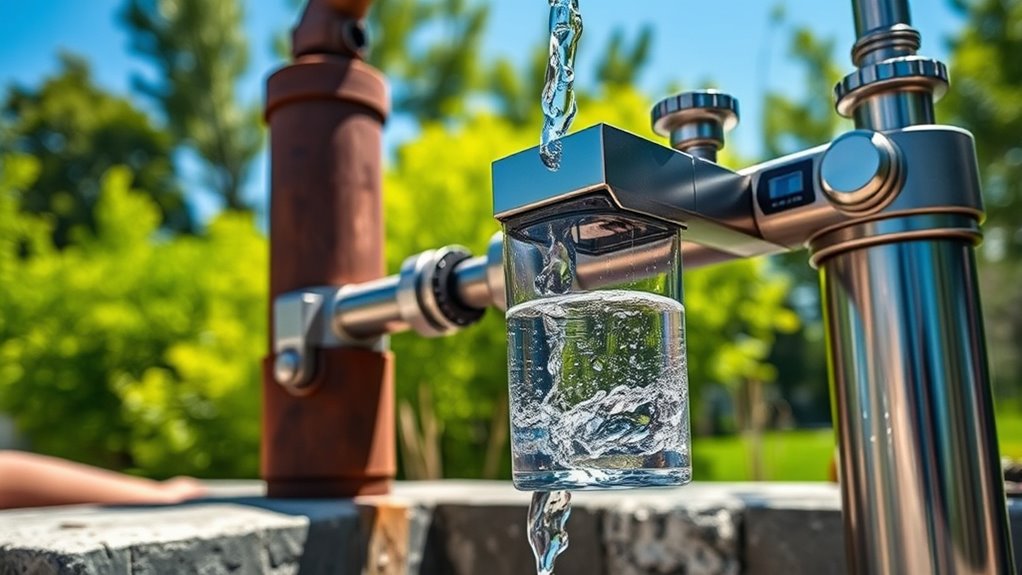
When selecting an iron filtration system, I consider the types of contaminants in your water, like iron, manganese, or other minerals. It’s also important to evaluate your flow rate needs, maintenance requirements, and how the system might affect your total dissolved solids. Additionally, installation complexity can vary, so I look for options that fit your home’s setup and your comfort level.
Water Contaminant Types
Understanding the types of contaminants in well water is vital for choosing the right iron filtration system. Iron can exist as ferrous (dissolved) iron, which is clear but causes staining and taste issues, or ferric (particulate) iron, visible as rust-colored sediment. Manganese often accompanies iron, contributing to staining, dark water, and odor problems. Hydrogen sulfide gas produces a rotten egg smell and can cause corrosion, requiring specialized filtration methods. Heavy metals like lead, mercury, and copper may also be present from natural sources or industrial contamination, posing health risks. Additionally, sediments, turbidity, and solids can carry iron, manganese, and other pollutants, making pre-filtration vital to protect the entire system and guarantee clean, safe drinking water.
Flow Rate Needs
Choosing the right iron filtration system hinges on matching its flow rate to your household’s peak water demand. I recommend evaluating your home’s maximum water use, especially when multiple fixtures run simultaneously, like showers and dishwashers. Typical household flow rates range from 10 to 15 GPM, so select a system that can handle or exceed this to prevent pressure drops. For larger homes or higher usage, consider systems with greater capacity or multiple units to maintain consistent flow and pressure. An undersized system may cause water pressure issues, while an oversized one could be unnecessary and more expensive. Regularly assess your peak flow needs to ensure your filtration system can reliably meet your household’s demands, providing continuous, safe water.
Maintenance Frequency
Selecting an iron filtration system involves not only matching flow rates but also considering how often you’ll need to perform maintenance. The frequency varies based on system type and water usage. Some systems require filter replacements every 6 months to a year, while media regeneration systems using air or oxidizers can last several years before needing attention. Regular water testing is vital to identify media saturation, signaling when cleaning or replacement is due. Larger capacity units or those with higher flow rates generally need less frequent maintenance than smaller models. Proper scheduling helps prevent clogging, pressure drops, and guarantees the system effectively removes iron, manganese, and hydrogen sulfide over time. Being aware of these factors helps you plan maintenance and keep your water consistently clean and safe.
TDS Impact
Since iron filtration systems primarily target removing iron and other specific contaminants, they generally don’t reduce the Total Dissolved Solids (TDS) in your water. This means the mineral content, including beneficial minerals like calcium and magnesium, remains largely unchanged after treatment. While some systems, such as reverse osmosis, can considerably lower TDS, they’re not typically used solely for iron removal and are usually paired with other filters. Keeping TDS levels balanced is important because water with too low TDS can taste flat or be corrosive to plumbing. When choosing an iron filter, it’s essential to recognize that these systems focus on iron removal without affecting TDS, so additional filtration might be necessary for thorough water purification.
Installation Complexity
The complexity of installing an iron filtration system largely depends on its design and features. Simpler, DIY-friendly models usually need basic plumbing skills and straightforward setup, while more advanced systems with multiple stages or electrical components—like air injection or UV sterilization—often require professional installation. Proper placement at the main water line is vital for effectiveness and can influence how difficult the process is. Additional components, such as pressure gauges, backwash valves, or bypass valves, can add to the installation effort. Water pressure and flow rate also matter; high-capacity systems may need reinforced plumbing or support structures. Overall, understanding these factors helps determine whether you can install the system yourself or need expert assistance.
System Durability
When choosing an iron filtration system, considering its durability guarantees it will stand up to the demands of well water. Durable systems typically use corrosion-resistant materials like stainless steel or high-quality plastics, which resist long-term water exposure and environmental wear. The lifespan of the filtration media, such as catalytic carbon or air injection components, also plays a pivotal role; high-quality media can last several years before needing replacement. Proper installation and regular maintenance are essential to prevent leaks, clogging, and media degradation, ensuring the system’s longevity. Additionally, systems with heavy-duty housings and reinforced fittings are less prone to cracks or leaks, even under high water pressure. Features like automatic regeneration or backwash cycles further extend the system’s operational life by reducing media clogging and wear.
Environmental Concerns
Choosing an iron filtration system with environmental concerns in mind means prioritizing methods that are safe for the planet. I look for systems that use chemical-free processes like air injection, which avoid releasing harmful chemicals into the environment. Regeneration methods that rely solely on air or eco-friendly media further reduce chemical waste and ecological impact. Proper disposal of spent media is vital to prevent soil and water contamination. I also prefer systems made from sustainable materials, such as BPA-free plastics and recyclable components, to support eco-friendly practices. Additionally, selecting solutions that extend equipment lifespan helps minimize waste and energy consumption. By considering these factors, I guarantee my water treatment is effective while protecting the environment for future generations.
Budget Considerations
Budget considerations play a essential role in selecting the right iron filtration system for well water. Prices vary widely, with basic models starting around $200 and advanced systems surpassing $2,000. It’s important to factor in both initial costs and ongoing expenses, such as filter or media replacements, which can cost from $50 to several hundred dollars annually. Some systems feature automatic regeneration or backwash functions, helping reduce maintenance costs over time. While budget-friendly options may be more affordable upfront, they often have limited capacity or shorter lifespans, leading to more frequent replacements and higher long-term costs. Investing in a higher-quality, durable system might cost more initially but can save money over its lifespan by minimizing repairs and replacements.
Frequently Asked Questions
How Often Should I Replace the Filters in These Systems?
I recommend replacing the filters every 6 to 12 months, but it really depends on your water usage and iron levels. I check my system regularly and follow the manufacturer’s guidelines. If I notice a drop in water quality or flow rate, I replace the filters sooner. Staying attentive helps guarantee your filtration system works effectively, providing you with safe, clean drinking water consistently.
Can These Systems Remove All Types of Iron From Well Water?
These systems can remove most types of iron from well water, including ferrous and ferric iron. However, some stubborn forms like oxidized iron may require additional treatment methods. I recommend testing your water first to determine the specific iron types present. Then, choose a filtration system designed for those particular iron forms. Regular maintenance and filter replacements ensure peak performance and pure, safe drinking water.
Are Maintenance and Filter Replacements Costly?
Maintenance and filter replacements for iron filtration systems can vary in cost, but I find them generally affordable. Regular upkeep is essential to keep your system running efficiently and guarantee your water stays pure. I recommend checking the manufacturer’s guidelines and scheduling routine inspections to catch any issues early. Investing in quality filters may seem costly at first, but it pays off by extending system life and maintaining your water’s safety.
Do These Systems Affect Water Pressure or Flow Rate?
Oh, absolutely—your water flow will come to a grinding halt, right? Not quite. Most iron filtration systems are designed to minimize pressure loss, so you’ll hardly notice a difference in flow rate. Of course, the actual impact depends on the system’s size and condition. I’ve found that maintaining and properly sizing your filter guarantees your water stays clean without sacrificing pressure or flow.
Are These Filtration Systems Suitable for Well Water With High Sediment Levels?
Yes, these filtration systems are suitable for well water with high sediment levels. I’ve found that many models include a sediment pre-filter, which effectively traps dirt, sand, and debris before the water reaches the iron filter. This not only prolongs the lifespan of the system but also guarantees cleaner, clearer water. If you have high sediment levels, I recommend choosing a system with a robust sediment filter to handle the load efficiently.
Conclusion
Choosing the right iron filtration system is like finding the perfect key to open pure, revitalizing water from your well. Each option acts as a loyal protector, shielding your home from unwanted minerals and ensuring every sip feels like a sip from a mountain spring. Trust your instincts, consider your needs, and you’ll soon be savoring the clarity and safety of water that’s as clean and bright as a clear blue sky.
